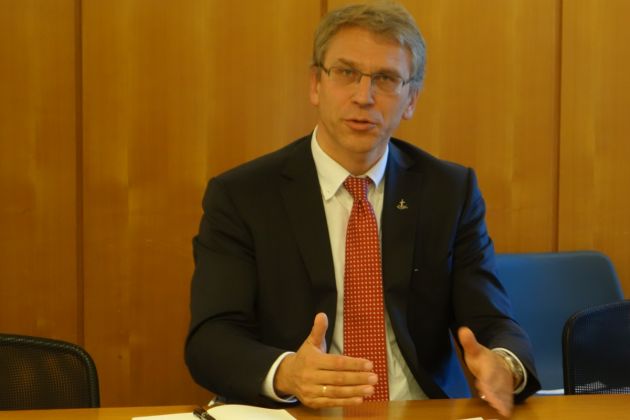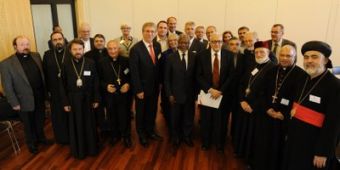World church group aims to bring all faiths to Syria peace meeting

GENEVA - The World Council of Churches says it is mobilizing churches and Muslim organizations from Syria, Russia, the United States and European nations to help it bring about a peace settlement for Syria.
The world church body which brings together some 560 million Christians from Anglican, Orthodox and Protestant churches around the globe plans to call a meeting of faith leaders parallel with the proposed Geneva 2 conference.
"In the last two weeks we have seen what we have not seen before. All kinds of church leaders from all around made efforts to argue against an attack On Syria. The world also called for new initiatives for a political process.
"There is no military solution to Syria.
"Now is the time to say everyone has failed and there has to be a change and that change has to include all parties and that includes the president [of Syria]," the general secretary of the WCC, Rev. Olav Fykse Tveit, told journalists in Geneva on Thursday.
The Geneva 2 Middle East peace conference (or Geneva 2) is a proposed United Nations-backed peace conference that would take place in Geneva in late 2013.
Its aim is to stop the Syrian civil war which has raged for more than two years and seeks to and organize a transition period and post-war reconstruction.

In a previous Geneva meeting on June 30, 2012, major global powers agreed on the principle of a political transition, but failed to stop the war.
GENEVA 2
The key aim of Geneva 2 would be to get all parties to agree on the principle of a political solution, and then build on a peace plan put forward by former U.N. Security Council secretary general, Kofi Annan at a June 2012 meeting.
Church leaders from Syria, Russia, the United States and European nations who met near Geneva on Wednesday called a political solution the only way towards peace in Syria.
Their stance was shared in a statement they issued following their meeting with Kofi Annan, former United Nations general secretary, and Lakhdar Brahimi, UN-Arab League joint representative for Syria.
The meeting was held on Wednesday organized by the WCC at the Ecumenical Institute in Bossey, Switzerland, where participants discussed the role of the churches in effectively moving all parties in Syria towards a peace agreement.
WCC general secretary Rev. Olav Fykse Tveit, who moderated the meeting, said, "The Geneva 2 conference must not fail now when thousands of people have already died."
Tveit said that all parties, inside and outside Syria, and the U.N. Security Council have to take their responsibility to make the talks work, and churches must support this process.
He added that since the Geneva 1 conference has resulted in little or no progress, the urgency of the upcoming Geneva 2 is more crucial than ever.
Annan and Brahimi suggested he call a meeting of faith leaders to parallel Geneva 2.
A statement issued at the end of the meeting said, "Churches must continue to raise their voice in their congregations, in their societies and with their governments. We must strengthen the public outcry so that those in power will protect the common interest of humanity."
It said, "We believe there can be no military solution to the crisis in Syria. It is time for the international community to assume its responsibility to end the violence and initiate a political process that brings peace for all the people of Syria."
Tveit, who moderated the meeting, said that the "Geneva 2 conference must not fail now when thousands of people have already died."
He said that all parties, inside and outside Syria, and the UN Security Council have to take their responsibility to make the talks work, and churches must support this process. He added that since the Geneva 1 conference has resulted in little or no progress, the urgency of the upcoming Geneva 2 is more crucial than ever.
A statement issued at the end of the meeting said, "Churches must continue to raise their voice in their congregations, in their societies and with their governments. We must strengthen the public outcry so that those in power will protect the common interest of humanity."
Among those who took part in Bossey were Archbishop Silvano Tomasi, Permanent Observer, Mission of the Holy See to the UN in Geneva; Rev. Martin Junge, general secretary of the Lutheran World Federation; Archbishop Hilarion of Volokolamsk, head of external relations for the Moscow Patriarchate in the Russian Orthodox Church along with key church leaders from Syria.